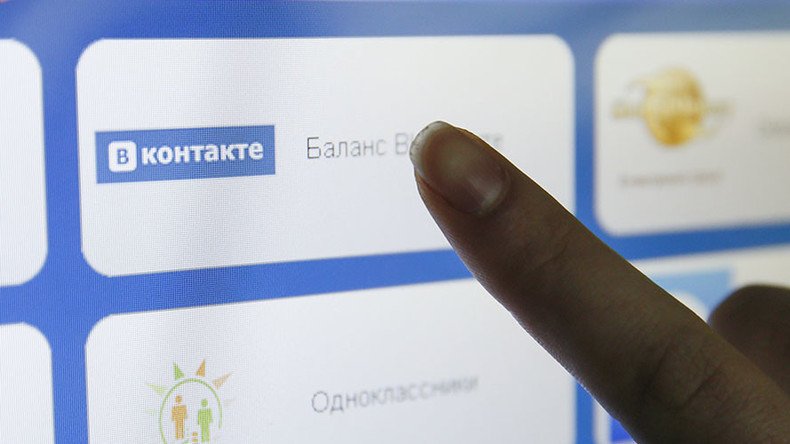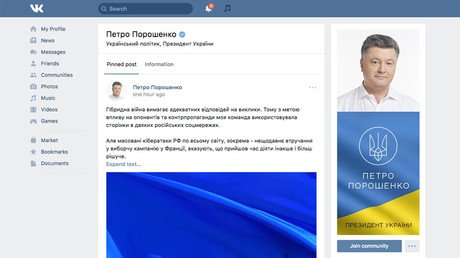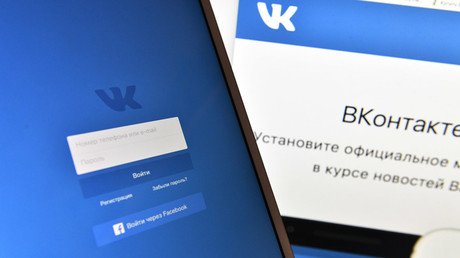$1bn & 2 years: Estimates show Kiev would pay hefty price to block Russian social networks

Ukraine will have to dig deep into its pocket if it wants to see the controversial ban on popular Russian social network VKontakte and other online services implemented, the head of Ukraine’s internet association warned, estimating costs at $1 billion.
The controversial bill, signed by Ukrainian President Petro Poroshenko into law Tuesday, bans Russian social networks VKontakte (VK) and Odnoklassniki, hugely popular among Ukrainians, as well as antivirus software maker Kaspersky Lab, search engine Yandex Ukraine, 1C Company, which provides popular business tools, and several other Russian media.
Internet providers that fail to block access to the web pages after the law comes into force are to face harsh penalties of up to the equivalent of 200 minimum incomes, Ukraine’s National Commission for the State Regulation of Communications and Informatization (NCCIR) said in a statement Tuesday.
The move, which is projected to affect some 15 million Ukrainian daily users of VK and over 11 million Yandex monthly users, has sparked fierce debates online, with those opposing it arguing that the measures are a form of censorship and trample on freedom of speech. Many vocal critics even consider it to be a sign of Ukraine gradually turning into “the North Korea of central Europe.”
Besides concerns about the law’s implications, there are considerable doubts about the Ukrainian government’s ability to ensure full compliance with the ban. One of the stumbling blocks on the road to it being implemented as envisioned in the presidential decree is the lack of technical means and overwhelming ensuing costs.
READ MORE: ‘Slap in the face:’ HRW slams Ukraine’s new law targeting anti-corruption activists
“If we are talking about this presidential order, it must be fulfilled after its entry into force. Speaking about the next steps, [its implementation will take] a year or two years or more, as well as the state’s $1 billion are needed,” Chairman of the Board of the Ukrainian Internet Association (UIA) Alexander Fedyenko said, commenting on the law to broadcaster 112 Ukraine.
With many noting that the ban could still be easily bypassed with the help of anonymous proxy servers, Fedyenko said that the only effective way to enforce it would be to block “not the websites but the whole autonomous systems where these websites and other platforms are located.”
Such sweeping action would impact not only the websites intended to be targeted by the law but other services as well.
“As a result, users will be deprived of access not only to the social networks such as VKontakte, but also to other platforms in this system,” Fedyenko said.
Reflecting on the law’s legal aspects on his Facebook page, Fedyenko argued that it infringes on the Ukrainian constitution and is in violation of the Convention for Protection of Human Rights.
"I think it is a wrong step and it is necessary to work now to prove its irrationality,” he wrote, adding that the Association had asked Ukraine’s presidential office to clarify the law and provide guidance on how to implement it.
While Kiev so far has not provided any details on the law’s practical enactment, save for threats to penalize its offenders, the Ukrainian authorities were quick to blame Russia for mounting a cyberattack on the presidential website allegedly in response to the law.
Deputy head of the presidential administration Dmytro Shymkiv said Poroshenko’s official website was taken down due to the overload in traffic and an alleged DDOS attack “from Yandex and VK sources” on Tuesday.
Meanwhile, Moscow denounced the decree as an example of “politically motivated censorship.”
“The Kiev regime uses all sorts of force to influence its citizens: from banning music and literature to military aggression against its people,” Russian Foreign Ministry spokesman Maria Zakharova told Kommersant radio.
‘MSM aren’t going to report something that paints Russia as a victim’
The controversial decree that is set to disrupt the social media of millions of Ukrainians will backfire on Poroshenko, dealing a blow to his image in the eyes of his remaining supporters, free speech campaigner David Adda argued, speaking to RT.
“It is not going to hurt Russia that badly, it is really just going to hurt him and his nation and his people and it is going to paint him in a bad light and give more power to the pro-Russian people within his own government that are working against him,” Adda said, branding the move a “disastrous decision.”
“Ukraine’s President Poroshenko is bit desperate, it seems, to try and gain some power back within his country and his party,” Adda said. He added that blocking a social network used by at least 11 million of his citizens is a “disastrous decision,” that makes Poroshenko a “more authoritarian person.”
Btw, Ukrainian president @poroshenko has an active, and official, group on the #Vkontakte site he's now banned. Selfie photo - yesterday. pic.twitter.com/c9R8mUu4uO
— Graham W Phillips (@GrahamWP_UK) May 16, 2017
As far as the law’s stated goal, to boost Ukraine’s national security, is concerned, Adda called it only a “half-reason” and said he believes that Kiev was motivated more by vindictiveness than anything else.
“Shutting it off completely just because it belongs to Russia, and Ukraine is still upset over Crimea ... does not make any sense,” he said, noting that to curb terrorism and propaganda there it is excessive to ban the whole network. “They are just going to lose a lot more people on their side,” he said.
However, it is unlikely that the move will be followed by outcry in the western media, as it typically occurs in the case of countries like China restricting access to social media tools, Adda said.
“They aren’t going to report something that paints Russia as a victim.”














